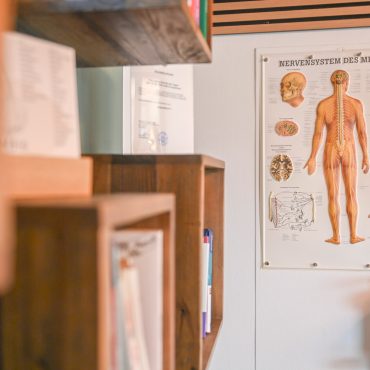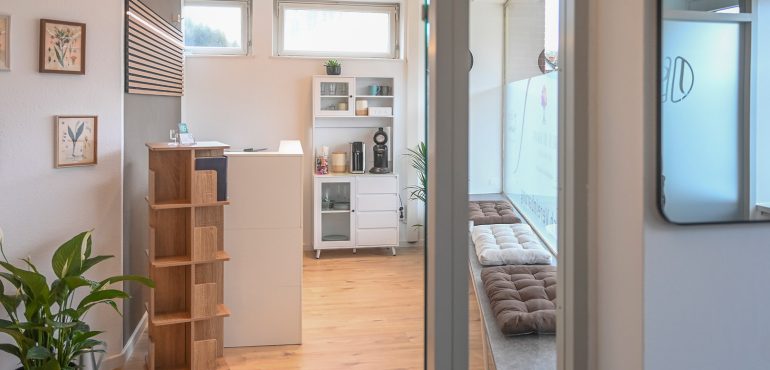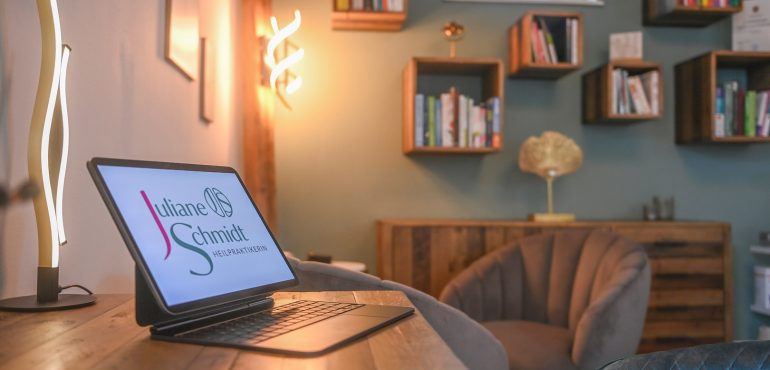Chronic stress makes us ill
The term “stress” comes from materials science and describes how much a material deforms under the influence of a certain force. In everyday language, it describes a physical and psychological reaction to demands that are perceived as threatening or overwhelming. In this case, a cocktail of stress hormones is released, which makes us particularly attentive, powerful and focused in the short term. A true magic trick of nature! However, chronic stress is harmful to health and can lead to exhaustion, susceptibility to infection, sleep disorders, burnout, metabolic disorders, cardiovascular diseases and many more.
I will help you to feel comfortable and balanced again and to have energy for the demands of your everyday life.
Your situation and your personality are crucial for our common selection of the appropriate therapy methods.

Hypnotherapy
Hypnotherapy is a powerful therapeutic method in which you are guided into a state of deep relaxation and focused attention – a so-called hypnotic trance. In this state, our unconscious and our deep inner creativity become more accessible.
read more
- Relaxation: Environmental stimuli fade into the background, making room for concentration and calm. Comparable states can be found in meditation, daydreaming or in the ‘flow’, which is experienced as complete immersion and total absorption in an activity.
- Self-confidence: Contact with unconscious levels of the brain and one’s own resources can be established, for example to evoke images of past successes. These inner images can be used to activate a sense of self-efficacy and trust in one’s own abilities.
- Sleep improvement: Through deep trances, we learn to experience restful relaxation again and to access our own abilities to relax and let go. Reasons for sleep disorders can be explored and dealt with.
- Behavioural change: Hypnotherapy can help to replace harmful stress compensation mechanisms with healthier habits. Classic examples here are smoking cessation and healthy eating habits.
- Pain relief: Similar to meditation, muscle tension, heart rate and blood pressure decrease in a trance, breathing becomes calmer and more regular and the ability to activate reflexes decreases. Chronic pain as a result of stress can be influenced because during hypnosis, the stress hormone level in the blood decreases and a mental distance to the pain can be built.

Resilience training
read more
- Emotion control: You are aware of your feelings and know what you can do to calm down when you are stressed, for example.
- Empathy: You are able to put yourself in the emotional world of others. This empathy enables you to show understanding for behaviours and to react appropriately.
- Impulse control: You can suppress or postpone your impulses and thus manage not to be distracted by disturbances.
- Causal analysis: You are able to recognise connections between problems and to learn from mistakes.
- Optimism: You have a positive attitude. You don’t sugarcoat anything, but you can still find something positive even in difficult situations.
- Self-efficacy: You are convinced that you can overcome difficult situations or tasks through your own actions.
- Goal orientation: You never lose your focus, no matter what happens. I prefer to use the term “directional orientation”, because achieving a defined goal provides relief, but then what? Another goal? And another one? Your direction, on the other hand, arises from your talents, the activities that you perform effortlessly and that contribute to a world in which you want to live.
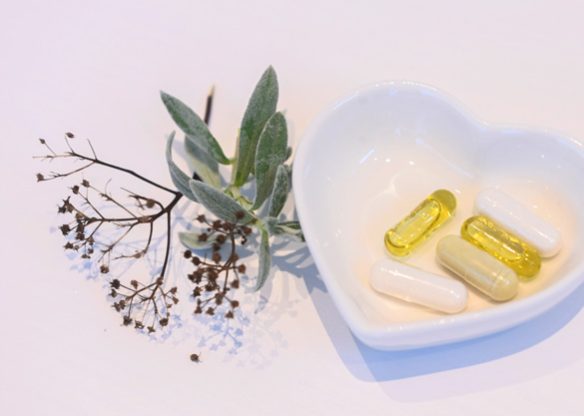
Micronutrient therapy
Micronutrient therapy focuses on supplying the body with essential micronutrients such as vitamins, minerals, trace elements, fatty acids and amino acids. The aim is to optimise the nutrient balance, compensate for deficiencies and promote health. Micronutrients are vital building blocks that the body needs to function optimally. In particular, high levels of stress are real micronutrient robbers, but so are many medications, environmental toxins, alcohol, certain foods and smoking. I use blood analyses to determine whether you have any deficiencies and recommend a personalised and targeted supplementation of missing micronutrients.
read more
How do micronutrient robbers operate?
Micronutrient robbers are substances, habits or living conditions that negatively influence the absorption, utilisation or storage of micronutrients in the body. They can throw the nutrient balance out of kilter and lead to deficiency symptoms, even with a balanced diet.
- Increased consumption: stress or illness increase the need for certain micronutrients.
- Reduced absorption: some substances inhibit the absorption of micronutrients in the intestines.
- Increased excretion: certain substances promote the breakdown or excretion of vitamins and minerals.
Typical micronutrient robbers
1. Foods and drinks
- Sugar and white flour products: increase the consumption of B vitamins and magnesium.
- Alcohol: puts a strain on the liver and leads to a deficiency of vitamins B1, B6, folic acid and magnesium.
- Caffeine (coffee, tea, energy drinks): promotes the excretion of calcium, magnesium and B vitamins.
- Soft drinks with phosphoric acid: can disrupt the calcium balance and impair bone health.
- Oxalic acid (e.g. in spinach or rhubarb): binds calcium and magnesium, which inhibits absorption.
- Phytic acid (e.g. in unfermented grain products): inhibits the absorption of iron, zinc and calcium.
2. Medications
- Antibiotics: can disrupt the intestinal flora, which impairs the absorption of B vitamins and vitamin K.
- Proton pump inhibitors (gastric acid blockers): reduce the absorption of vitamin B12, magnesium and iron.
- Laxatives: promote the loss of potassium, magnesium and water-soluble vitamins.
- Diuretics (water pills): cause the loss of potassium, magnesium and other minerals.
3. Lifestyle factors
- Stress: increases the consumption of magnesium, vitamin C and B vitamins.
- Smoking: reduces vitamin C, E and beta-carotene due to increased oxidative stress.
- Intensive sporting activity: increases the need for magnesium, zinc, iron and B vitamins.
4. Environmental factors
- Pesticides and heavy metals: can impair the absorption or function of trace elements such as zinc, selenium and copper.
- Air pollution: leads to a higher consumption of antioxidants such as vitamins C and E.
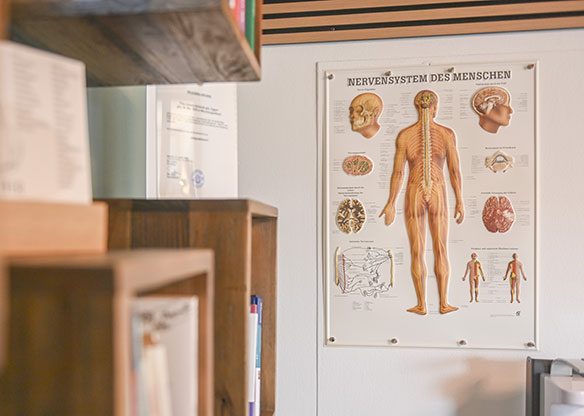
Neural therapy
The so-called wheal is part of the neural therapy according to Huneke and supports the body in the self-healing of acute pain. This method is used primarily for muscle tension in the back, shoulder and neck area – which is often stress-related.
The injection of the anaesthetic procaine (< 2%) with a fine cannula into the upper layer of skin (dermis) causes a targeted interruption of pain stimuli.
read more
The injections trigger small swellings = wheals filled with fluid. The active ingredient then spreads through the tissue to the painful muscle area. This also stimulates the local blood flow, which leads to overheating and thus to loosening of the muscle.
Why are muscle tensions in the back, shoulder and neck area often stress-related?
- Stress reaction:
When we are under stress, the body activates the vegetative nervous system (sympathetic nervous system), which leads to an increase in muscle tone. The muscles in the back, shoulder and neck area are often particularly affected. That makes sense! When a human, as an upright mammal, is exposed to a threat = stress, the muscles must be able to switch quickly to fight or flight and the gait must be particularly upright for a better overview. Incidentally, the pupils also dilate so that we can see well into the distance. - Chronic tension:
If the stress lasts a long time, the muscles remain constantly tense, which can lead to pain and restricted mobility. - Poor posture and lack of movement:
People under stress often unconsciously adopt unfavourable postures. In addition, stress often leads to a reduced urge to move, which can restrict blood flow to the back muscles. - Stress hormones and inflammatory processes:
Stress increases the release of the stress hormone cortisol. Chronically elevated cortisol levels can promote inflammatory processes in the body and intensify the sensation of pain. At the same time, regenerative processes such as the healing of minor injuries in muscles and connective tissue are inhibited. - Psychosomatic factors:
Stress can intensify the sensation of pain by altering the way the brain perceives pain. Unresolved stress or psychological strain often manifests physically in the back. We literally carry too much of a burden on our shoulders.
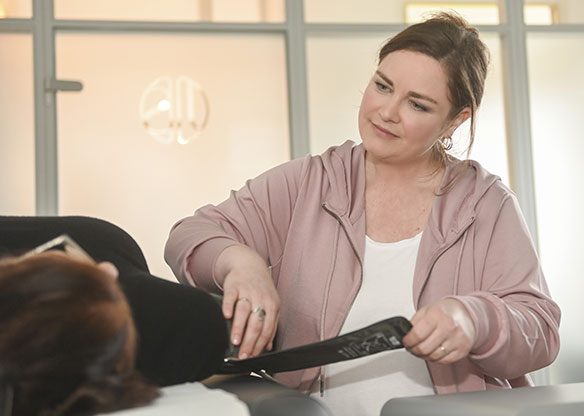
ABI diagnostics
ABI diagnostics is a procedure for assessing the condition of blood vessels by measuring the ankle-brachial index (ABI). The ABI is the ratio of the systolic blood pressure at the two ankles to the systolic blood pressure at the two upper arms. The measurement is done with my special equipment at all four points at the same time. It is non-invasive, painless and takes about 15 minutes.
read more
It is often used to detect peripheral arterial disease (PAD), also known as ‘intermittent claudication’, in which the arteries in the legs are narrowed or blocked by atherosclerosis. As a result, the muscles are no longer adequately supplied with oxygen and nutrients due to insufficient blood flow, which manifests itself with pain and cramps after walking a short distance.
But in the case of arteriosclerosis, vascular changes are often not limited to the legs. Patients with PAD are at increased risk of cardiovascular diseases such as heart attack or stroke, which can be better assessed at an early stage when using ABI diagnostics.
Advantages of ABI diagnostics for stress patients:
- Stress patients have an increased risk of cardiovascular disease due to the effects of chronically elevated stress hormone levels. The measurement provides early information about the condition of the blood vessels, even if no symptoms have yet developed.
- Often, patients suffering from stress hardly perceive the warning signals of their body themselves. The measurement and interpretation of the ABI index is a scientifically recognised procedure that makes the assessment of certain health risks tangible.
- ABI diagnostics supports the selection and prioritisation of suitable therapy methods and lifestyle changes to alleviate or prevent stress-related complaints. It also enables appropriate follow-up.
- The measurement results can be presented to the family doctor or specialist, in order to initiate further therapy approaches there if necessary.
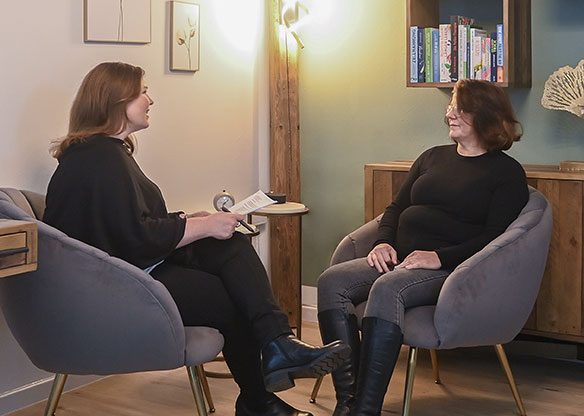
Nutritional therapy
Nutritional therapy is an approach to improving health by adjusting diet. It is based on scientific knowledge about how food and nutrients affect our bodily functions and is, of course, closely related to complementary micronutrient therapy.
read more
The aim of my consultation is to support you in choosing a nutritious, natural, everyday and, above all, delicious diet. In doing so, we take into account existing symptoms, intolerances and your own individual preferences.
How does nutritional therapy help with stress?
1. Improvement in quality of life:
- Mental health:
Magnesium, Omega-3 fatty acids and complex carbohydrates can help stabilise your mood. - Energy and performance:
The right diet supports physical and mental performance. - Sleep:
Certain foods such as cherries, cashews and walnuts promote the formation of melatonin, a sleep-inducing hormone.
2. Disease prevention:
- Antioxidant-rich foods protect against cell damage and strengthen the immune system.
- Fibre-rich foods support healthy digestion.
- Anti-inflammatory foods help to reduce inflammatory reactions in the body. They thus lower the risk of many chronic diseases such as allergies, rheumatic diseases, gastrointestinal or thyroid disorders, osteoporosis, cardiovascular diseases, periodontitis and other chronic infections.
- Intermittent fasting can promote metabolic flexibility, i.e. the body’s ability to switch between different energy sources such as carbohydrates and fats as primary energy sources depending on availability and need. This lowers the risk of metabolic diseases such as insulin resistance often resulting type 2 diabetes.
3. Support for existing diseases:
- Diabetes:
Blood sugar spikes can be avoided by choosing the right combination of carbohydrates. - Irritable bowel syndrome:
Adopting a low-FODMAP diet can alleviate symptoms such as bloating and abdominal pain. - Food intolerances:
For example, a gluten-free diet for coeliac disease or low-fructose products for fructose intolerance.
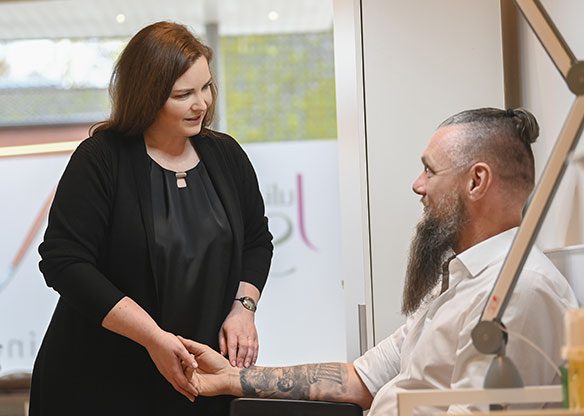
Phytotherapy
Phytotherapy or herbal medicine uses medicinal plants or their components that have specific effects on the body. These can be, for example, calming, immune-boosting, anti-inflammatory, digestive or pain-relieving properties. All of these properties are particularly important for stress patients. A special focus of my work is the use of so-called adaptogens.
read more
Adaptogenic plants are medicinal plants that can increase our resistance to stress, improve our concentration and boost our performance and stamina. They promote the body’s ability to adapt to physical, emotional or environmental stress. Adaptogens work by regulating the stress system, in particular the hypothalamic-pituitary-adrenal (HPA) axis. This axis controls the release of stress hormones such as cortisol.
What do adaptogens affect?
- Stress: They reduce the negative effects of stress and promote resilience.
- Energy: Adaptogens can increase energy levels and promote mental clarity.
- Immune system: Many adaptogens strengthen the immune system.
- Sleep: Some adaptogens promote restful sleep.
- Performance: They support mental and physical endurance, for example during intensive work or sports.
- Homoeostasis: Adaptogens promote the restoration of balance in the body.
Some well-known adaptogens and their specific benefits:
- Ashwagandha: Promotes relaxation and reduces anxiety, can improve sleep quality and lower cortisol levels, supports cognitive function and memory.
- Roseroot: Increases physical and mental stamina, reduces fatigue and supports those who are exhausted, promotes a positive mood.
- Ginseng: Strengthens the immune system and concentration, supports physical performance, promotes recovery from stressful periods.
- Reishi: Supports relaxation and the immune system.
- Cordyceps: Boosts energy and endurance.
- Chaga: Has antioxidant properties and strengthens general vitality.
- Maca: Supports hormonal balance and energy, can increase libido and physical resilience.
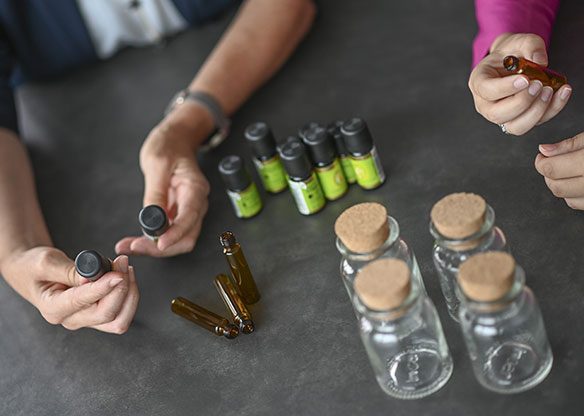
Aromatherapy
Essential oils are the defence mechanisms of the plant world and have a direct effect on our physical, mental and emotional well-being. These oils are obtained from various parts of plants such as flowers, leaves, bark or roots and contain their concentrated active ingredients. In aromatherapy, we find the essential oils that help you with your symptoms. Nature offers a great deal of support, particularly when it comes to reducing stress and relaxing, improving mood, improving sleep and relieving pain.
read more
You will discover what an underrated miracle our sense of smell is! It is closely linked to feelings and memories because it is the only one of our senses that goes directly and unfiltered to the areas of the brain that control emotions and memory without going through the thalamus – our ‘gateway to consciousness’.
Here are some examples of the effects of essential oils:
- Stress reduction & relaxation: lavender, chamomile, neroli or bergamot promote calm and reduce stress hormones.
- Mood enhancement: citrus scents such as orange, tangerine or grapefruit have an energising and positive effect.
- Sleep improvement: scents such as lavender, ylang-ylang or cedarwood can help with insomnia.
- Pain relief: peppermint or eucalyptus can help with headaches, muscle or joint pain.
DIGITAL
ANAMNESIS QUESTIONNAIRE
If possible, please bring this completed anamnesis questionnaire with you to your first appointment. The questions it contains will help us both to get a picture of your personal and health situation, formulate goals and agree on the treatment path.
Remuneration
Overview
Hourly rate
Hourly rate: € 120.00
Billing is per 15-minute period or part thereof.
20% surcharge for consultations between 10 p.m. and 6 a.m., as well as on Sundays and public holidays.
For house calls, a travel fee of €1.25 per kilometer between the practice and the home visit location will be charged in addition.
Blood sampling incl. express sample delivery
Blood sampling incl. express sample delivery: € 20.00
The costs for laboratory diagnostics of blood, stool, hair and urine (quantitative) depend on the type and scope required. The patient will be informed of the costs incurred and the billing arrangements before the order is placed with the respective laboratory.
ABI diagnostics
ABI diagnostics: €55.00
The determination of the ankle-brachial index (ABI) by simultaneously measuring blood pressure in both arms and both ankles is charged at a flat rate. This includes the use of the measuring system, a 15-minute time interval and the evaluation.
Urine analysis (qualitative)
Urine analysis (qualitative): €5.00
Infusion (excluding infused substance)
Infusion (excluding infused substance): €25.00
FAQ
Frequently asked questions
We will schedule each appointment to fit with your calendar. You come to me to feel less stressed and not more stressed by inflexible opening hours. Would you like appointments after work in the late evening hours? Or before work in the early morning hours? With pleasure!
We start with a detailed anamnesis interview, which begins with questions about your current symptoms. Then we set out together to find the causes. I want to get a complete picture of you and your circumstances, for which every piece of the puzzle is an important contribution. This also includes physical examinations and possible laboratory analyses. Our first appointment together usually takes two hours. The desired outcome at the end of the appointment is that you have formulated your health goal, we have chosen a suitable therapeutic approach for you in this direction and we have defined the first steps.
We will arrange follow-up appointments to see if the treatment approach is still right for you, how the first steps went and which steps should follow at what pace. This process is as individual as you are. I don’t believe in one-size-fits-all therapy.
My practice is a self-payer practice. No guarantee is given for a possible reimbursement of costs by a private health insurance company, a supplementary insurance or state aid.
For follow-up appointments that do not require any sampling for laboratory values, home visits are also possible.
Noch Fragen
Sie haben weitere Fragen?
Sed diam nonummy nibh euismod tincidunt ut laoreet dolore magna aliquam erat volutpat. Ut wisi enim ad minim veniam.
Are you dealing with stress?
Then let’s talk about it.
Whether in our private surrounding or in business, stress weighs heavily on our daily lives and prevents us from dealing with situations appropriately and effectively. Learn how to avoid stress and which methods will help you in stressful situations.

